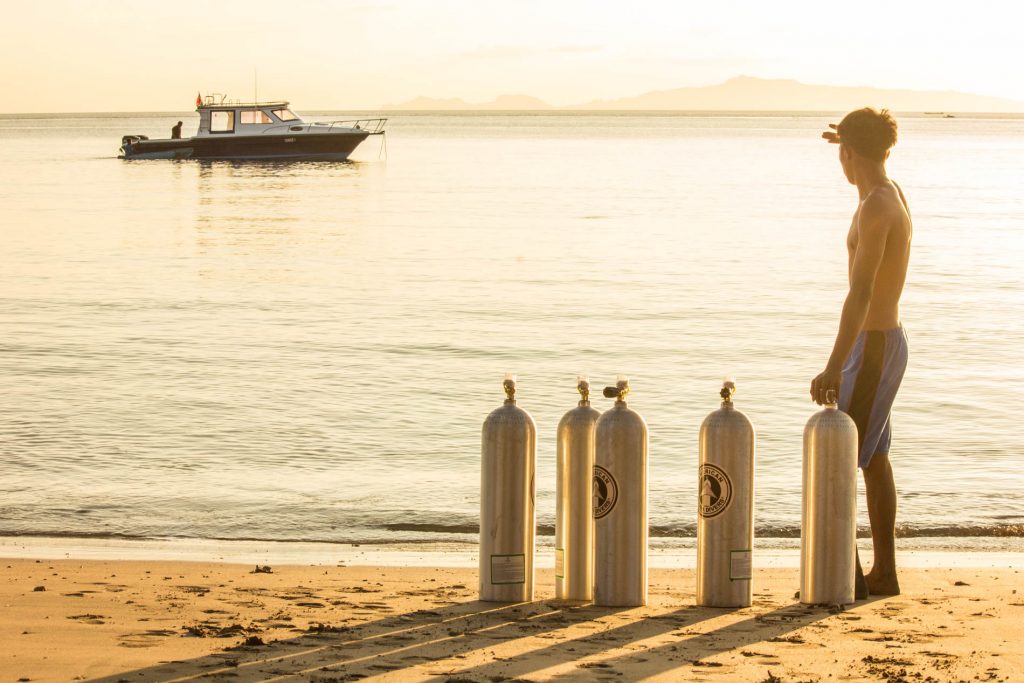Pilgrim Adventure is based in Copenhagen, Denmark and made purely out of love for nature and adventure.
My name is Morten and as a passionate diver / traveler myself, I know what I prefer when it comes to exploring remote parts of our world.
That is why I founded Pilgrim Adventure. Nature, authenticity and culture are the main focuses.
All our trips are tailormade – which means you do not have to travel in big groups of strangers! And you do not have a Scandinavian guide holding up a flag. What you do have; is freedom, independency, safety and the convenience of a full package tour – with local guides – to places not normally on the travel agencies’ menus!
A short background story to put Indonesia into perspective…
I was working in Hawaii when a co-worker gave me my first scuba dives – and I was hooked from the start. Of other interesting places was India in which I was lucky enough to explore for more than a year while making furniture in the jungle. Especially the Himalayas of India got a special place in my heart.
I went diving in the Indian Andaman Islands and travelled to the Philippines for a few months purely for diving. Egypt has been visited a handful of times as well. South America and Nepal for a lot of trekking in different terrain, shamans & more… Lived in Greenland for 4 years, where we executed treks on a weekly basis.
Indonesia became my favorite place for the underwater world, because of its people, and the pristine nature.
Pilgrim Adventure knows the pulse of Indonesia, and over the years we have established real friendships and business partnerships throughout the vast archipelago. We are collaborating with the Indonesian Embassy of Copenhagen alongside with Wonderful Indonesia and we are recommended by Dyk For Alle.
Maybe you already know what travelling can do to you… That little glimpse of something other than the ordinary… Showing a greater coexistence with the whole of our planet, its people and the natural world. It goes deep inside of us. It may sound grandiose, but this is what we feel – hence the name Pilgrim Adventure – referring to an inner change.
Tourism helps the local economy and supports the necessary activities for justifying marine parks and supervision. Along all this we strive to help the Coral Triangle and its life. Please read more about this subject below.
Enjoy & Explore Our Site!
The Coral Triangle
The Coral Triangle includes the waters of Indonesia, Malaysia, the Philippines, Papua New Guinea, Timor Leste and the Solomon Islands. Indonesia has some of those rare pockets that contains the holy grail of highest marine biodiversity found anywhere.
With more than 1,400 fish species and 75% of all the coral species that are known to the world, Indonesia is known as the species factory, and there are still many to be discovered.
Most of the people who live here reside in the rural areas and rely on the ocean for their livelihood.
The threats facing the marine life and coral reefs in these places include fishing practices that are destructive, run off from the farms, coastal development and tourist activities that are uncontrolled.
Additionally, climate change is a threat with impact that includes the rise of temperatures of sea water. The health of the ecosystem is also threatened.
There remains significant conservation gaps across Indonesia, despite large-scale conservation initiatives. These areas are often overlooked due to their remote locations, lack of obvious conservation draw, and the severe shortage of conservation capacity and funding.
That is why, we have hooked up with Thrive Conservation, a local NGO in Indonesia. Their projects include re-introducing the zebra shark into Raja Ampat waters, make safe nursery zones for oceanic mantas; hinder illegal fishing methods and give the local communities alternative ways of livelihood, and the list goes on. If you want to support them you are more than welcome to do so via this link button – THANK YOU!
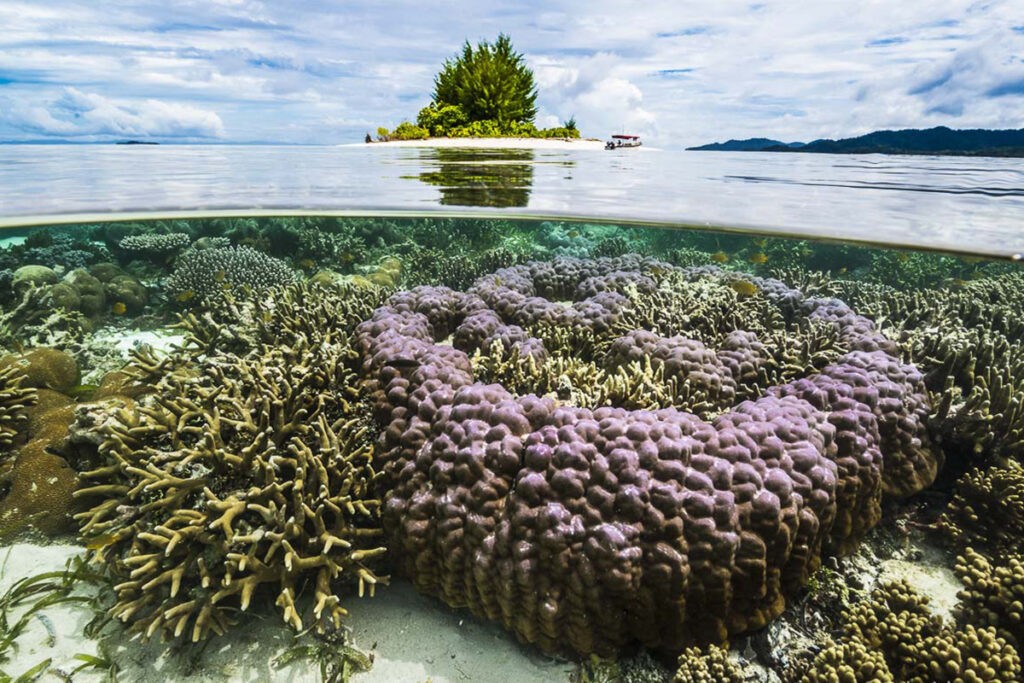
Culture & Religion
One official language Bahasa Indonesia, and 652 regional languages spoken across the country., including Javanese, Sundanese and Balinese.
How many Indonesians speak English is difficult to say however, perhaps 10% of Indonesians can speak English reasonably well, in fact some can speak fluently.
If you want to learn to speak a little bit of Bahasar, we highly recommend a free phone app called: Duolingo. Or get a small booklet in the airport or where ever you can.
It is highly appreciated by the people and they are very happy to see someone showing respect in that way. Of course it is also practical, if you want to communicate what you would like to eat, drink or ask for help. And it sounds really cool.
It is a relatively easy language to learn and the alphabet is the same as ours.
The Indonesian Constitution states “every person shall be free to choose and to practice the religion of his/her choice” and “guarantees all persons the freedom of worship, each according to his/her own religion or belief.”
87 percent of Indonesians declared themselves to be Muslim, followed by 9.87 percent who were Christian and 1,7 percent Hindu.
Hindus of western Java moved east and then to the island of Bali and the neighbouring small islands, thus starting Balinese Hinduism.
Indonesia has the largest Islamic population in the world and for this reason is often recognized as a Muslim nation.
Aceh in the westernmost part of Sumatra, is the only area where Sharia law is officially practiced in the country. The controversial Islamic legal code was first introduced in 2001, after the capital, Jakarta, granted more autonomy to the region in an attempt to appease rebels who were waging a long-term insurgency.
The large variety of different cultures, religions and traditions throughout the country is also expressed in numerous exciting and interesting events, both religious and popular, that are held throughout the year.
Among these are the colourful religious Hindu Dharma ceremonies held continuously on Bali, the court processions during Sekaten in Yogyakarta, Java, preceding the birth date of the Prophet Mohammad, as well as the Tabot Festival in Bengkulu, Sumatra, a ceremony commemorating the role of Prophet Muhammad’s grandchildren, Hasan and Husein in spreading the faith.
The Buddhist Vaisak Ceremonies are held yearly around Borobudur, as is the Chinese Toa Peh Kong festival in Manado, while the Feasts to the Dead are held in Toraja, both latter on the island of Sulawesi, and the Kasada ceremony is held annually at the end of the year on Mt. Bromo in East Java, the appease the ancestors and the mountain gods.
Then there are the exciting simulated tribal wars in the Wamena valley of Papua, the bull races on the island of Madura held as thanksgiving after the harvest, as well as the “nyale” festival in Lombok, to collect the sea worms that appear here each February only, and many more events on all islands.
And to top it off is the event of complete silence called “nyepi” in Bali, the day of meditation for the entire island, when all lights, fires, sounds, including planes and cars are barred for 24 hours! The Balinese have mooted that “nyepi” becomes an international tradition that will greatly reduce pollution and global warming.
For an overview check this calendar:
Many aspects of Indonesian etiquette and culture may not be obvious to a first-time traveler. Here are some general pointers. But remember: No one will expect you to know everything from the jump.
If you remain humble, curious, and polite, even if you make a mistake you will not be offending anyone. Simply apologize and learn how to do it right.
- Avoid using your left hand. This could be for touching someone, handing something to someone, or indicating towards something. The left hand is used for all bathroom activity, and considered ‘dirty’.
- Cover up. This is a very important, simple point of etiquette. Make sure you know what is appropriate for where you are visiting and what you are doing. If you are scuba diving and snorkeling, of course it is acceptable to be wearing swimwear at the resort and dive boat.
- Don’t show the soles of your feet. This also includes touching someone with your foot or pointing to something with your foot. It’s considered disrespectful.
- Finish your whole plate of food. When you visit a local home or someone has cooked specifically for you, make sure you clean your plate. This will show you respect and appreciate their time – and of course, love their food. Similarly, if you are offered a beverage when visiting a local home, say yes. If your tea or coffee is sweet, it means they like you.
- Respect elders and people in high positions. Not that you shouldn’t respect everyone else as well, but make an extra effort to greet elders and people in high positions politely. Even ducking or bending a little bit is something you will see when people walk past guests on the dive boat etc.
- Be patient. Indonesia has a very relaxed stance when it comes to time. Transport may not run on time, appointments may be late, and services can take longer than you expect. Don’t get flustered or angry. If you are in a rush, a gentle ‘maaf, saya buru-buru’ will let them know you are in a hurry.
- Always be polite, perhaps overly polite. If you are in the face of conflict – be it an angry market owner or policeman pulling you over – remain calm. You will get a lot further in defusing the situation if you carefully explain what’s happened rather than spewing threats and insults.
- Smile. Indonesians are known to be incredibly friendly and curious. If you’re traveling through an area that doesn’t often see foreigners, you are sure to be greeted and questioned often. A huge smile and kind answers will get you a long way. Avoid being dismissive or judgmental.
- Ask questions. When visiting a religious site, taking part in a religious practice, or simply touring a town, ask lots of questions to your Indonesian guides and friends. Indonesians are incredibly proud of their culture and are happy to share. This is also true if you are not sure how to act or feel uncomfortable in a situation – ask questions to make sure you are following proper Indonesian etiquette.
- Not a must, but learning a little bit of Bahasar Indonesia can benefit your experience.
Remember to always follow the advice and guidelines of your own country’s ministry of safety.
Indonesia is huge, so when you read the list, do not get scared.
We bring our children along with us, without a worry for terrorism or kidnappings, but we have changed our plans before when it comes to the Philippines. The situation there is much different.
On the mainland of West Papua, there is an urge for Independence from Indonesia to reunite with Papua New Guinea. However, that situation does not affect the islands of Raja Ampat and foreigners are not specifically targeted.
Ambon and Maluku have seen civil unrest during the 1990’s, and to this day there could still be a higher risk, at religious and political gatherings. If you are going for scuba diving in Halmahera on small remote islands it shouldn’t be a concern for you.
For more advice feel free to ask us or go to:
https://www.gov.uk/foreign-travel-advice/indonesia/safety-and-security
&
https://www.gov.uk/foreign-travel-advice/indonesia/terrorism
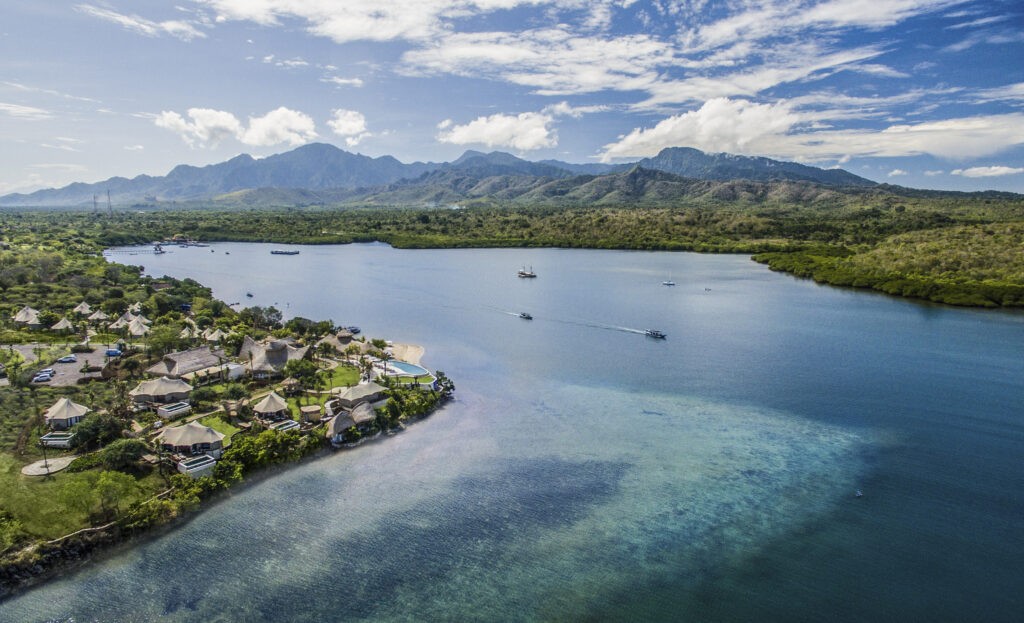
Tips & Tricks
Good news… Maybe you don’t equalize the pressure correctly. Many people don’t know, that you need to get that pop in your ears, similarly to being on an airplane.
Usually dive instructors and happy divers well tell you to pinch your nose and press – thereby forcing air up your inner ear tubes, hence making your eardrum getting equalized in pressure. However, this method can sometimes have some faults.
We recommend to instead; pinch your nose and then swallow. You can do one ear at a time by tilting your head to the side, making the air go directly up to the eardrum pointing upwards. This exercise is different because it lets your muscles relax and you do not force the air, risking a rupture on your eardrum!
If you have difficulties equalizing underwater, never ever force it. Let your dive buddy know, and go slowly up until you can equalize. Speak with your dive guide before diving about this subject if you have any concerns about it!
And never ever, feel like you cannot skip a dive. If you for whatever reason do not feel like diving. Just skip it. No one cares more than you do!
Simply put, being in the tropics, many places have aircon and a lot of it! Be careful about getting too cold – especially on your neck, chest and ears. Always be prepared for ending up on a plane with too much aircon. Carry some warm clothes with you, even though it seems odd to pack Buff neck wear, but they are super handy to put on your ears and neck. We never leave home without two at least.
We know you are tough and can stand the cold, however – aircon is a different beast – that can easily ruin your dive holiday.
If you get a cold, where your ears physically cannot equalize, you must not dive. You will rupture your eardrums at the least or worse.
We talk from experience and know how difficult it can be to hold back on diving when you are finally in a Divers’ Paradise!
It’s best to take Indonesian Rupiah to Bali. If you can’t buy some before your trip, the next best options are Australian Dollars (AUD), US Dollars (USD) or Euros (EUR). You can most likely find better exchange rates in Indonesia than in your home country.
In Indonesia, recent issue higher denomination US Dollar bank notes will enjoy a better exchange rate when compared to smaller denomination dollar bills. If you are carrying US Dollar cash, it is best to ensure recent issue unmarked, unfolded 50s and 100s.
It is sometimes tough to find banks or money changers willing to accept hundred dollar bills that are over five years old. Notes from 1996 notes are particularly difficult due to the Indonesian market being flooded with counterfeit 1996 bills a few years back. People are simply not willing to take the risk in exchanging notes that they consider have a high chance of being forgeries. If you think you might be doing some serious shopping, make sure you bring with you crisp, clean, newer notes–it actually does make a difference!
ATM machines are the best way forwards for taking money (exchange rate wise) as these will use the exchange rate at your home bank, and this will favor your home currency.
However, machines here are limited in the number of notes they can dispense at one time, and this can mean that you have to insert your card repeatedly to withdraw a worthwhile amount of cash. With most currencies, the machines here dispense the equivalent of 5 dollar bills or 10 dollar bills! Depending on how your bank charges you for use of ATMs overseas, you could end up paying large bank charges to withdraw fairly insignificant sums of money, thus negating the benefit of the higher exchange rate.
There are ATM machines throughout the international airports, as well as a number of money changers. Money changers at either the airport or your hotel are unlikely to offer the very best exchange rates, but the difference will only be minor, and the convenience quite possibly negates any loss.
Authorized Money Changers (displaying signs) in specialist money changing shops and kiosks are the best way to change cash to save time and get a good rate.
Note: Some money changers are a little less than scrupulous. You should always count your money before leaving and not just rely on watching them count it.
Every effort is made to make sure your trip is holiday and carefree. However, we do recommend you purchase trip cancellation/interruption insurance in the event of unexpected changes in your travel plans.
You should also have adequate medical insurance to cover any incidents. Check with your medical insurer before the trip to verify you’re covered while traveling abroad and scuba diving.
We also recommend you consider purchasing supplemental dive insurance, offered by many firms such as Divers Alert Network (DAN), PADI, and Dive Assure. These companies offer specific dive-related policies that often include travel, gear and accident coverage all in one comprehensive policy.
All throughout Indonesia you will find two round pin sockets (Indonesian / European standard) and the electricity is 220v.
Remote resorts and homestays do have a power generator to make electricity for a few hours in the evening. But do not expect 24hour electricity at your disposal if you go to remote places.
This subject is likely to awaken the fundamentalists who thinks no one should use long fins for scuba diving but only for spearfishing. But they work great for scuba diving!!
If you are a relatively good diver, with a good sense of the space around you, long fins allow you to relax much more underwater. Less energy spent, less air spent. If YOU cannot go against the current in these – no one can!
They also add an extra level of safety as you can much quicker get over to your buddy in case of an emergency.
We also recommend a pointer stick. A very simple tool. Normally every dive guide carries one. They work great to push away from rocks or sandy bottoms, so you won’t need to risk touching a stone fish or something similarly poisonous, stirring up sand etc. And of course never touch anything!
In case you have an overnight stay in a hotel without a mosquito net, bring your own. It weighs noting and gives you a good nights rest without that worrying summing for the ears.
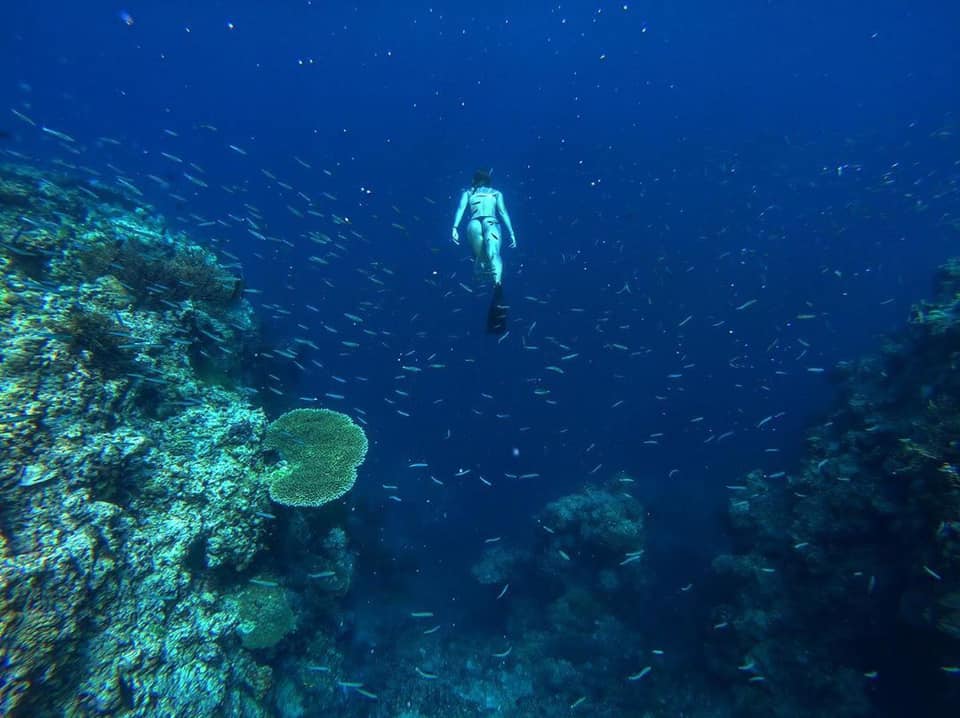
Currents
The Indonesian Throughflow (ITF) refers to the transfer of upper ocean waters from the Pacific to the Indian Ocean through the Indonesian Seas.
The overall result is the largest movement of water on the planet which flows through the Indonesian archipelago. It is normal to dive in a 2-3 knot current. Sometimes reaching 5, but that is rarer.
Because of the trade winds and ocean currents which run in opposite directions, the Pacific Ocean, to Indonesia’s northeast, is twenty centimetres above average sea level, while the Indian Ocean, to its southwest, is ten centimetres below.
This thirty centimetre difference sets in motion a massive movement of water from the (higher) Pacific Ocean through the archipelago’s complex underwater topography—through trenches, basins, channels, ridges, shelves and sills—then out into the (lower) Indian Ocean.
This is a very important component for our planet as the variability and changes of the ITF have significant impacts on Indo-Pacific oceanography and global climate.
It also makes for a super nutrient rich ocean, which is why Indonesia is at the top, for marine biodiversity, both in regards to fish life and corals.
The deep cold water brings up a lot of nutrients that when they reach a certain temperature nearer to the surface, starts to bloom as plankton, attracting all our best friends such as mantas, molas and so on!
Besides the Indonesian Throughflow, the cycle of the moon affects the movement of water.
The current will be strongest around New AND Full Moon. And weakest around first and third quarter.
Including 2-3 days on each side of the New or Full Moon.
To see a lunar calendar for Indonesia, open this link: https://www.timeanddate.com/moon/phases/indonesia/endeh
- Carry a safety marker buoy and a reef hook.
- Listen carefully to the dive briefing.
- Let the dive guide and buddy know about your concerns. Do not be afraid to ask them about when the currents might come, where they will take you, and what you should do. Most of the times you just need to relax and enjoy drifting slowly over corals.
- Buoyancy control must be understood.
- Do not get separated.
- The closer you stay to the landscape the better you can find shelter. Hide behind corals or big rocks.
- Use your reef hook to hold on (only on rocks!), so you do not exhaust yourself finning against the current waiting for your buddies.
- Orientation: Look at the landscape, will it push you upwards? Will you need to let air out of your BCD? Will you need to hold on to a rock to maintain a safety stop? Should you swim in a certain direction, not to get too far away from the others?
- Be mentally prepared for it. Remember it is only moving water. But respect it and listen carefully to the dive guides if they tell you to come closer, get shallower or stay behind them.
Well, it is ONE BIG OCEAN. So it will be moving. But there are great differences in the level of current exposure on different dive sites and times.
You can avoid the strongest of currents:
- Let it be known to the dive crew and speak with them about how they can take you to more sheltered sites.
- Choice of dive site, timing (slack high tide), 1st or 3rd quarter of the moon cycle.
- Some locations of Indonesia are less prone to strong currents and more sheltered than others. Get our advice. But please do not get surprised when you encounter a current regardless. It is the ocean. Like they say, “No current, no life”! And many people love to drift dive.

Health
As parts of Indonesia are in a malaria zone, please check with your physician or medical center if they advice you to take anti malarial medication. If so, you should ask: “What are the known side effects in regards to diving etc”?
Make sure you take the appropriate medications in time before you start the trip.
The risk of getting Malaria in most of Indonesia is very low, however, your doctor may advise taking anti-malarial medication.
Experts recommend scuba divers not to take Mefloquine (known as Lariam). Typically, you need to begin taking your prophylaxis a week prior to departure.
Mosquitoes carrying this disease bite around dusk. The best strategy is to avoid getting bitten. Net, spray, ocean breeze.
Dengue fever can be common during the rainy season in certain areas. There is no drug to take for this disease. Mosquitoes carrying this disease bite in the afternoon hours. A good strategy to avoid dengue fever is to dive in the afternoon!
There are hospitals of international standards in all of the major cities of Indonesia.
But most of our destinations are a days travel away from major cities, so you got to have a travel insurance in case of an evacuation.
Throughout the archipelago you can find small clinics with doctors who can provide basic medical help.
When travelling in the tropics, it is wise to be up to date with Typhoid, Tetanus/Diphtheria, Hepatitis and a current Polio protection. Consult with your own doctor is a must.
https://www.sikkerrejse.dk/vaccinationer/indonesien/
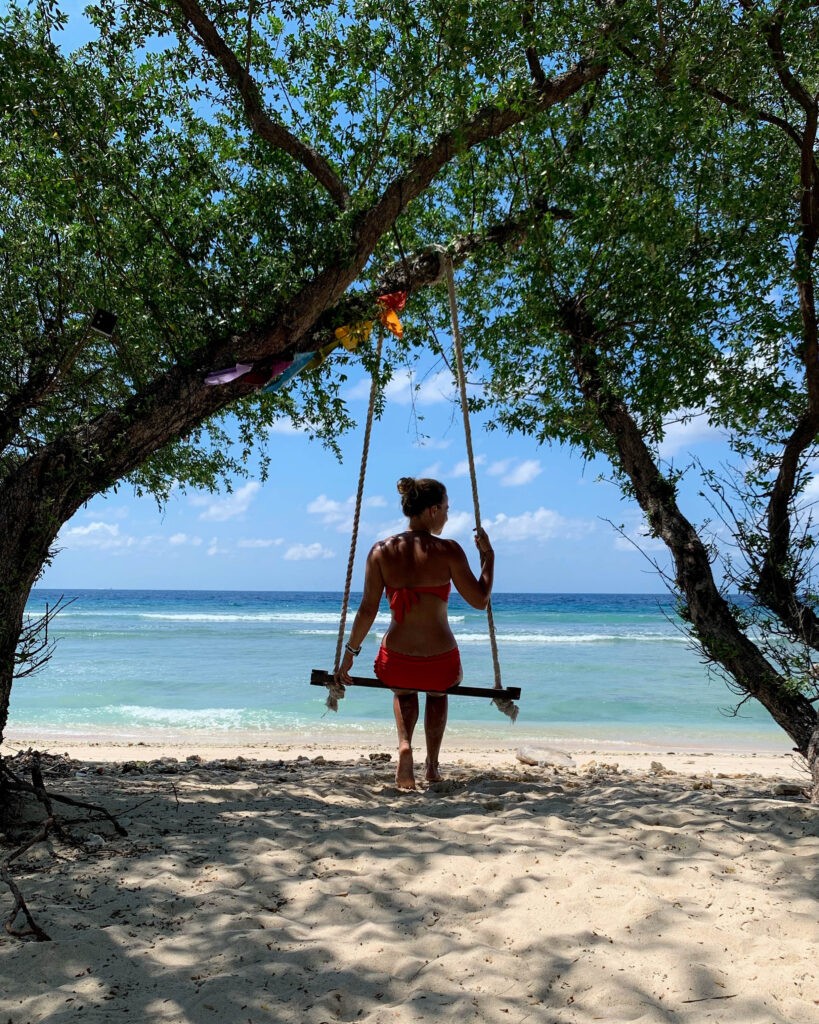
VISA
In order to enter Indonesia, the validity of your passport must run for at least six months beyond your date of entry into Indonesia, and you must have at least one empty page in your passport, totally clear for stamps or stickers.
Entry into Indonesia is possible for the nationals from Denmark, Sweden and Norway by purchasing a 30 day “Visa-on-Arrival” at the time you land in Indonesia.
It is now possible to apply for a 30 or 60 day e-VOA, making the process quicker than ever. We will send you the necessary guide after purchasing your trip.
Visa-on-Arrival is IDR 500,000 (~€35) per person and can be paid in Rupiah or any major currency as well as Visa or MasterCard. For convenience, cash is also accepted. Immediately after your arrival into Indonesia, you will be free to travel throughout the country.
For visitors who wish to stay in Indonesia for more than the 30 day visa, it is recommended to secure a 60 day visa in advance of your travel either from the Indonesian Consular Mission closest to your home or via the new e-VOA.
https://kemlu.go.id/copenhagen/en
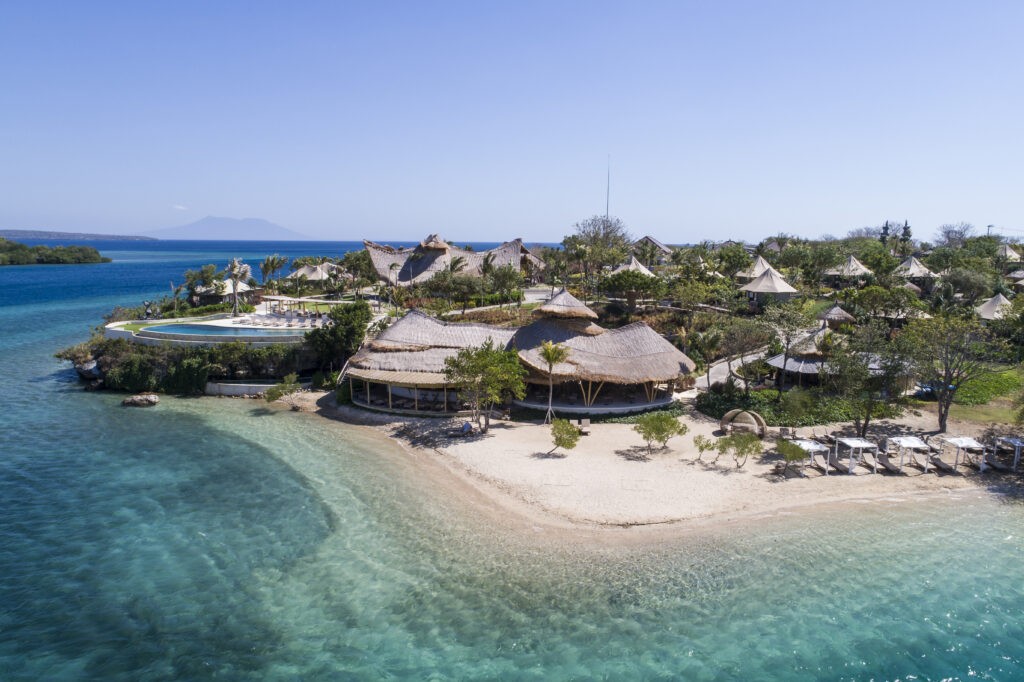
The Medical Statement
Every diver and student must complete and sign a Medical Statement, which includes a number of questions relating to your medical history.
If you can answer “No” to all of the questions on page 1 you are good to go!
If you answer “Yes” to any questions you will need to see a Doctor and complete page 2. The remaining pages are for your Doctor to look at, if needed.
Please download the medical statement form (PDF) below. Thank you!
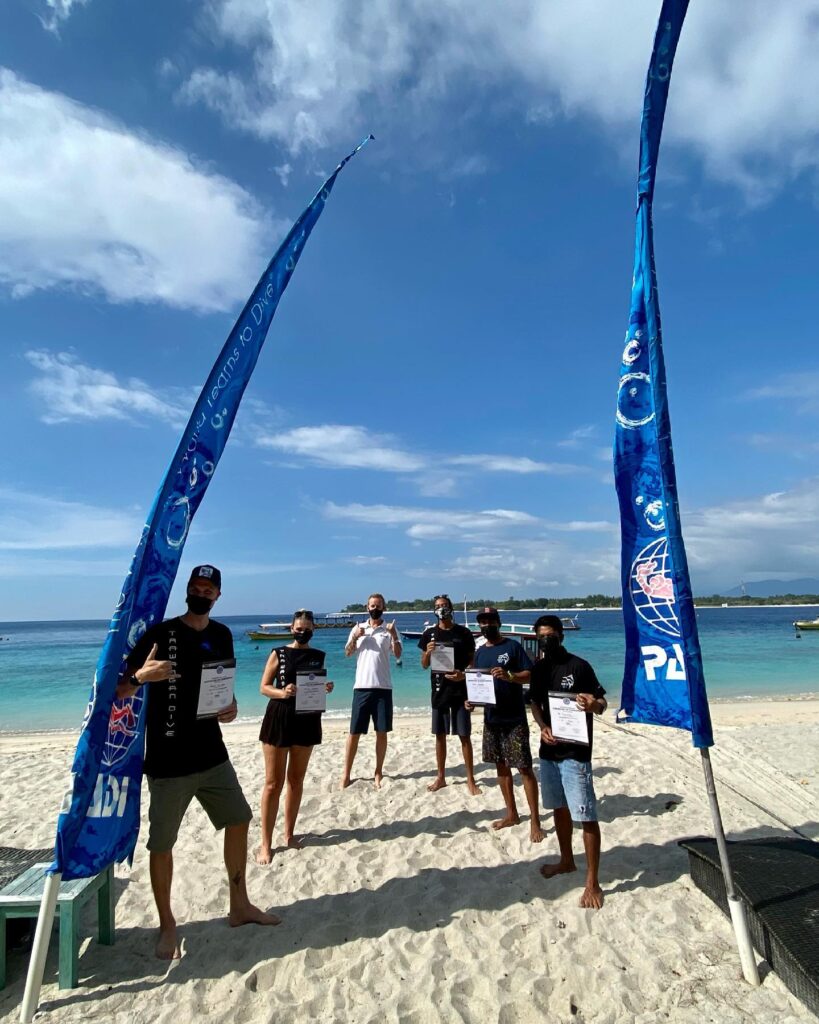
Travel Insurance
We strongly strongly recommend that you have a travel insurance.
A travel insurance is a must because it helps you if you need medical treatment, evacuation, if you have any accidents etc.
Make sure your insurance covers scuba diving, if you are going to dive.
And please do check if your ordinary insurance already contains a travel insurance.
We recommend Gouda @ https://www.gouda.dk/
However, any insurance that can cover scuba diving and travel in Indonesia will do.
